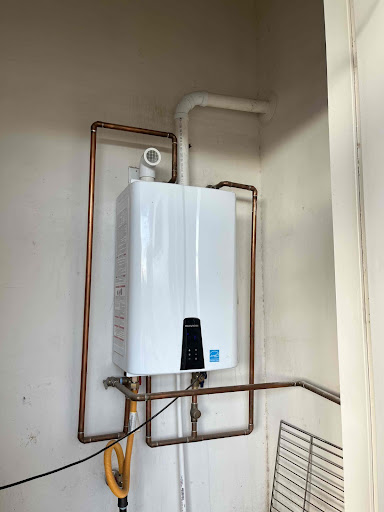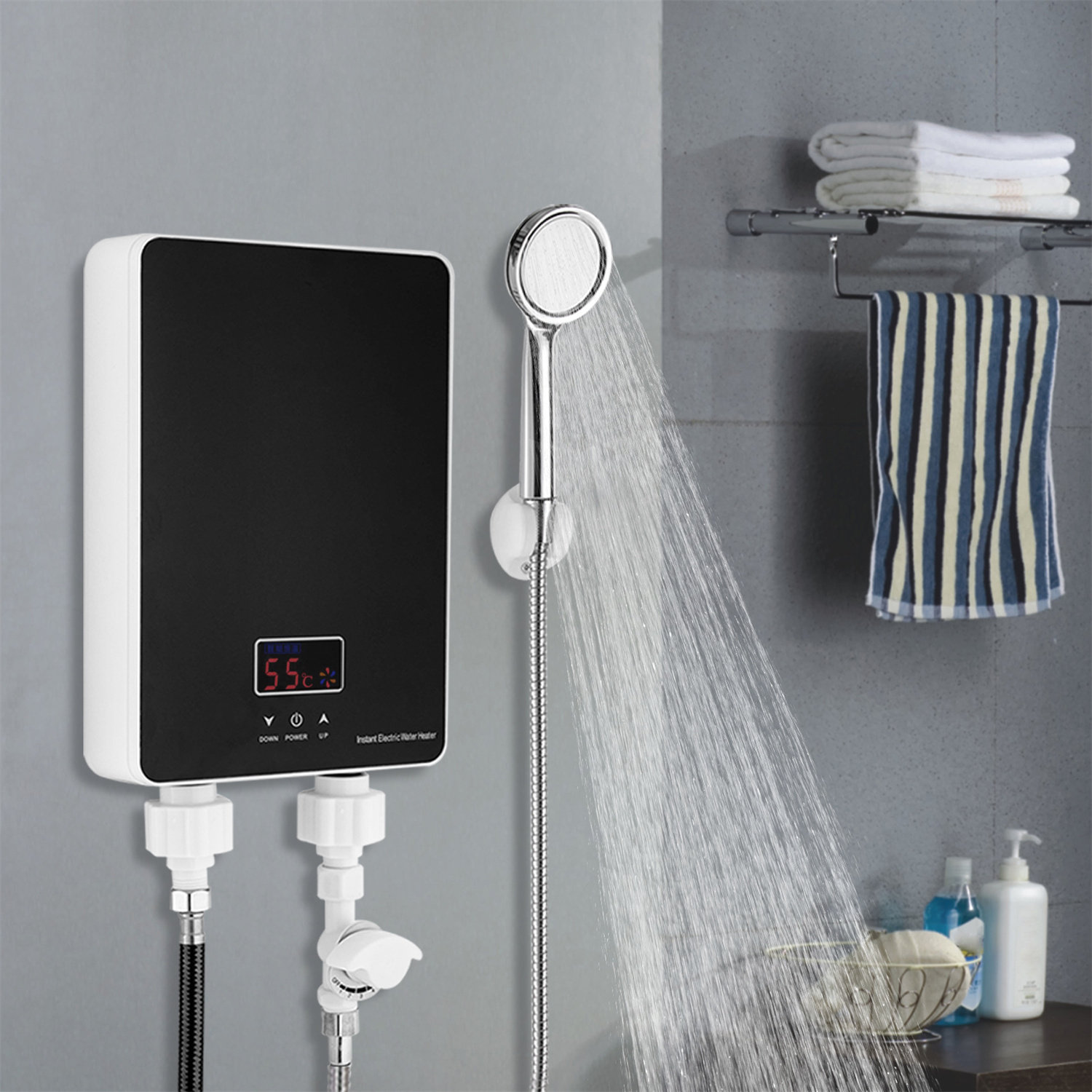Listed here down the page you can get a good deal of excellent resources concerning Six Benefits of a Tankless Hot Water Heater.

In a globe where ease and effectiveness preponderate, it's no surprise that homeowners are constantly in search of smarter means to manage their home's power usage and comfort. One technology that has continuously gotten popularity is the tankless water heater. However what exactly makes these systems stick out from the standard tank-based designs a lot of us grew up with? Let's dive in and discover the advantages of tankless water heaters, helping you decide if it's time to make the button in your home.
Intro
Photo this: you step into the shower after a long day, anticipating a relaxing cascade of warm water, only to be welcomed by icy beads due to the fact that the last person utilized all of it up. Sound familiar? Conventional water heaters keep a fixed quantity of warm water, indicating you're at the mercy of that tank's supply. Tankless systems, on the other hand, warmth water as needed. Say goodbye to running out mid-shower, no more wrestling with schedules just to guarantee warm water is offered.
Recognizing Tankless Water Heaters
What Are Tankless Hot Water Heater?
Tankless water heaters, in some cases called on-demand or instant hot water heater, give warm water only as it's required. As opposed to saving gallons of pre-heated water, these devices kick right into action the minute you turn on the tap. Water passes through a warm exchanger, warming up in real-time, meaning you get a continuous flow of warm water without the requirement for a big tank sitting idly by.
Just how Do They Vary from Typical Equipments?
Standard heating units hold a tank of warm water, utilizing energy to keep that tank at a constant temperature. Tankless devices eliminate the standing supply, reducing wasted energy and the cumbersome footprint of a large cyndrical tube. Essentially, you're upgrading from a "stockpile" mindset to a "made-to-order" strategy.
Typical Sorts Of Tankless Systems
Tankless water heaters normally come in two selections: gas and electric. Gas designs tend to provide higher circulation prices, ideal for bigger families, while electrical models usually offer smaller homes and are usually simpler to set up. Furthermore, some systems are made for point-of-use (serving one fixture) while others can take care of the entire home's warm water needs.
Trick Benefits of Tankless Water Heaters
1. Countless Hot Water Supply
Ever before needed to arrange showers so everybody obtains their fair share of hot water? With tankless, that ends up being a thing of the past. As long as the heating unit's circulation ability isn't surpassed, you can take back-to-back showers without becoming a popsicle.
2. Energy Performance and Cost Savings
No more heating up a giant storage tank's well worth of water and maintaining it cozy throughout the day. Tankless heating systems reduce standby power losses, which can decrease energy expenses. While the preliminary cost might be greater, the lasting financial savings commonly validate the investment.
3. Space-Saving Design
If your home is short on storage space, eliminating the bulky container maximizes important room. Tankless systems are compact and can usually be installed on wall surfaces, concealed in edges, or mounted in limited utility storage rooms without grabbing all of the entire area.
4. Longer Lifespan
A properly maintained tankless hot water heater can outlive its tank-based cousin. Standard tanks could last 10-15 years, while tankless versions can maintain downing along for two decades or even more, making them a strong financial investment in time.
5. Improved Water High Quality
Saving water in a tank can occasionally cause sediment build-up or a slightly "off" preference. With tankless systems, fresh water is heated up on the spot, lowering the chances of debris accumulation and potentially supplying cleaner-tasting water.
Considerations Before Switching
Though the benefits are engaging, it's a good idea to consider a few factors before totally dedicating.
Preliminary Financial Investment Prices
Tankless heating systems generally include a higher upfront price. Between the system itself and potential setup adjustments, the first cost may offer you sticker label shock. But remember to watch it as a lasting financial investment.
Installation Demands
Relying on your home's infrastructure, you may require additional electrical capacity or gas line upgrades. Ensure you recognize the installation needs and talk to an expert to stay clear of shocks.
Reviewing Your Home's Water Use Patterns
If your family all at once uses multiple fixtures with high warm water demand, make sure the system's circulation rate meets your demands. Recognizing your use patterns assists you select the right dimension and type of tankless heating system.
Upkeep and Care Tips
Tankless systems are fairly reduced maintenance, however they aren't set-it-and-forget-it devices.
Normal Cleaning and Descaling
Hard water minerals can build up in the heat exchanger, affecting efficiency. Normal descaling (frequently suggested yearly) maintains the device running at peak performance.
Annual Professional Assessments
A yearly checkup from an expert makes sure minor problems are captured early. They'll assess the device's efficiency, search for leaks, and assist preserve optimum effectiveness.
Guaranteeing Appropriate Air Flow
For gas designs, correct air flow is essential to safely eliminate exhaust gases. See to it venting systems are clean and correctly mounted to avoid any possible safety dangers.
Contrasting Different Brands and Designs
Not all tankless hot water heater are developed equal.
Investigating Reliable Makers
Look for trusted brand names with a history of generating top quality systems. A reputable producer typically supplies far better customer support and longer warranties.
Reviewing Reviews and Customer Feedback
User evaluations and feedback from neighbors or friends who have actually gone tankless can provide useful insights. In some cases, real-life experiences can be a lot more telling than marketing sales brochures.
Installment: DIY or Specialist?
While some home owners delight in taking on tasks themselves, tankless installment could not be the very best time to break out the tool kit.
Benefits and drawbacks of DIY Installation
A do it yourself mount can save money, yet it comes with risks. Wrong setup can lead to inadequacy or safety and security problems. If you come in handy and have experience, it may be possible-- yet wage care.
When to Call a Specialist Plumbing
For the majority of, calling a professional makes certain everything's done correctly. An expert plumbing comprehends regional codes, sizing needs, and airing vent parameters, reducing the threat of problems.
Maximizing Performance
You have actually bought a tankless system-- now maximize its efficiency.
Optimum Temperature Settings
Many people establish their devices in between 120-140 F. Readjusting the temperature can boost convenience and financial savings. Experiment to locate a pleasant place that does not waste energy.
Pairing with Low-Flow Fixtures
Want to extend your device's capabilities? Think about installing low-flow showerheads and faucets. They decrease water use, permitting your tankless system to supply a steady stream of warm water without stressing.
Environmental Influence
Tankless water heaters straighten with greener living goals.
Minimized Carbon Footprint
By utilizing less power and only heating water as needed, tankless systems can decrease your home's carbon impact, reducing your ecological impact.
Conserving Natural Resources
Much less power intake and much less thrown away warm water convert into less natural deposits being used, an ecological win-win.
Who Benefits A Lot Of from Tankless Heaters?
The appeal of tankless heating units is that they can match a range of houses.
Big Family Members vs. Single Owners
Huge family members may love the unlimited warm water supply, while solitary residents value the power cost savings from not heating up a whole container for just a single person's morning shower.
House Owners with Minimal Space
If your home is short on square footage, losing the cumbersome tank maximizes space for other fundamentals-- or perhaps just more elbow room.
Eco-Conscious Consumers
Going tankless aligns with environmentally friendly values, guaranteeing you're not squandering energy or sources.
Future Patterns in Tankless Hot Water Heater
The globe of home appliances is ever-evolving, and tankless water heaters are no exception.
Smart Home Assimilation
Visualize readjusting your water heater's temperature level by means of an application or getting upkeep informs on your phone. As wise home technology advancements, we'll see even more connection and convenience.
Improvements in Innovation
R&D is frequently improving warmth exchangers, making units extra efficient and sturdy. Future designs may be also quieter, much more compact, and far better fit for differing environments.
Verdict
Picking a tankless hot water heater is more than just updating your home's warm water system; it's buying lasting convenience, energy efficiency, and a greener way of living. By considering your house's water use, being mindful of installation requirements, and committing to regular maintenance, you can delight in a steady stream of hot water without the baggage of a bulky container. As technology advances, you can look forward to also smarter, a lot more efficient tankless solutions that not just make your life less complicated yet additionally benefit the planet.
Why You Should Consider a Tankless Water Heater for Your Home
Energy Efficiency and Cost Savings
Tankless water heaters, also known as on-demand water heaters, heat water only when needed. This means they don't waste energy keeping a tank of water hot constantly. This efficiency translates into substantial cost savings on your monthly energy bills.
Endless Hot Water Supply
One of the significant advantages of tankless water heaters is their ability to provide a continuous supply of hot water. Traditional tank water heaters have a limited capacity and can run out of hot water, especially during peak usage times. In contrast, tankless water heaters can provide an endless stream of hot water, making them ideal for larger families or homes with high water usage.
Space-Saving Design
Tankless water heaters are compact and take up significantly less space compared to traditional tank heaters. They can be installed on walls, under cabinets, or even outside, freeing up valuable space in your home. This makes tankless water heaters a great option for smaller homes or properties with limited space for a traditional water heater.
Longer Lifespan and Lower Maintenance
Tankless water heaters typically have a longer lifespan compared to traditional tank heaters. They can last up to 20 years or more with proper maintenance. Additionally, tankless systems are designed with replaceable parts, which can extend their lifespan further and reduce long-term maintenance costs.
Environmentally Friendly
Reducing energy consumption not only saves you money but also benefits the environment. Tankless water heaters contribute to a smaller carbon footprint by using less energy to heat water. Their energy efficiency and ability to minimize standby heat loss make them an eco-friendly choice for environmentally conscious homeowners.
Customized Temperature Control
Tankless water heaters offer precise temperature control, allowing you to set the desired temperature to meet your specific needs. This level of customization ensures you always have water at the perfect temperature for your comfort and usage requirements.
https://beantownservices.com/blog/consider-tankless-water-heater-for-your-home

I hope you enjoyed reading our section about Pros and Cons of Tankless Water Heater. Thank you for spending some time to read our article. Liked our write-up? Please quickly share it. Help other people find it. I recognize the value of your readership.
Additional Information